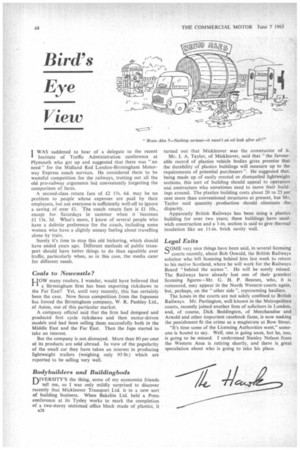Bird's Eye View
Page 46

If you've noticed an error in this article please click here to report it so we can fix it.
I WAS saddened to hear of a delegate to the recent
Institute of Traffic Administration conference at Plymouth who got up and suggested that there was " no need" for the Midland Red London-Birmingham Motorway Express coach services. He considered them to be wasteful competition for the railways, trotting out all the old pro-railway arguments but conveniently forgetting the comparison of fares. A second-class return fare of f..2 15s. 6d. may be no problem to people whose expenses are paid by their employers, but not everyone is sufficiently well-off to ignore a saving of over £1. The coach return fare is £1 10s., except for Saturdays in summer when it becomes I 13s. 3d. What's more, I know of several people who have a definite preference for the coach, including some women who have a slightly uneasy feeling about travelling alone by train. Surely it's time to stop this old bickering, which should • have ended years ago. Different methods of public transport should have better things to do than squabble over traffic, particularly when, as in this case, the media eater for different needs.
Coals to Newcastle?
HOW many readers, I wonder, would have believed that a Birmingham firm has been exporting rickshaws to the Far East? Yet, until very recently, this has certainly been the case. Now fierce competition from the Japanese has forced the Birmingham company, W. R. Pashley Ltd., of Aston, out of this particular market.
A company official said that the firm had designed and produced first cycle rickshaws and then motor-driven models and had been selling them successfully both in the Middle East and the Far East. Then the Ups started to take an interest.
But the company is not dismayed. More than 80 per cent of its products are sold abroad. In view of the popularity of the small car they have taken an interest in producing lightweight trailers (weighing only 93 lb.) which are reported to be selling very well.
Bodybuilders and Buildingbods
DIVERSITY'S the thing, some of my economist friends tell me, so I was only mildly surprised to discover recently that Mickleover Transport Ltd. is in a new sort of building business. When Bakelite Ltd. held a Press conference at its Tystey works to mark the completion of a two-storey sectioned office block made of plastics, 'it B28 turned out that Mickleover was the constructor of it.
Mr. J. A. Taylor, of Mickleover, said that "the favourable record of plastics vehicle bodies gives promise that the durability of plastics buildings will measure up to the requirements of potential purchasers ". He suggested that, being made up of easily erected or dismantled lightweight sections, this sort of building should appeal to operators and contractors who sometimes need to move their buildings around. The plastics building costs about 20 to 25 per cent more than conventional structures at present, but Mr. Taylor said quantity production should eliminate the disparity.
Apparently British Railways has been using a plastics building for over two years', these buildings have sandwich construction and a 1-in. section is said to give thermal insulation like an 11-in, brick cavity wall.
Legal Exits SOME very nice things have been said, in several licensing courts recently, about Bob Oswald, the British Railways solicitor who left licensing behind him last week to return to his native Scotland, where he will work for the Railways Board "behind the scenes ". He will be sorely missed. The Railways have already lost one of their grandest licensing figures—Mr. G. H. P. Beames, who, it is rumoured, may appear in the North Western courts again, but, perhaps, on the "other side ", representing hauliers.
The losses in the courts are not solely confined to British Railways. Mr. Partington, well known in the Metropolitan courts, recently joined another firm of solicitors in London, and, of course, Dick Beddington, of Merchandise and Arnold and other important casebook fame, is now making the punishment fit the crime as a magistrate at Bow Street.
"It's time some of the Licensing Authorities went," someone is bound to say. Well, one is going soon, but he, too, is going to be missed. I understand Stanley Nelson from the Western Area is retiring shortly, and there is great speculation about who is going to take his place.




































































































